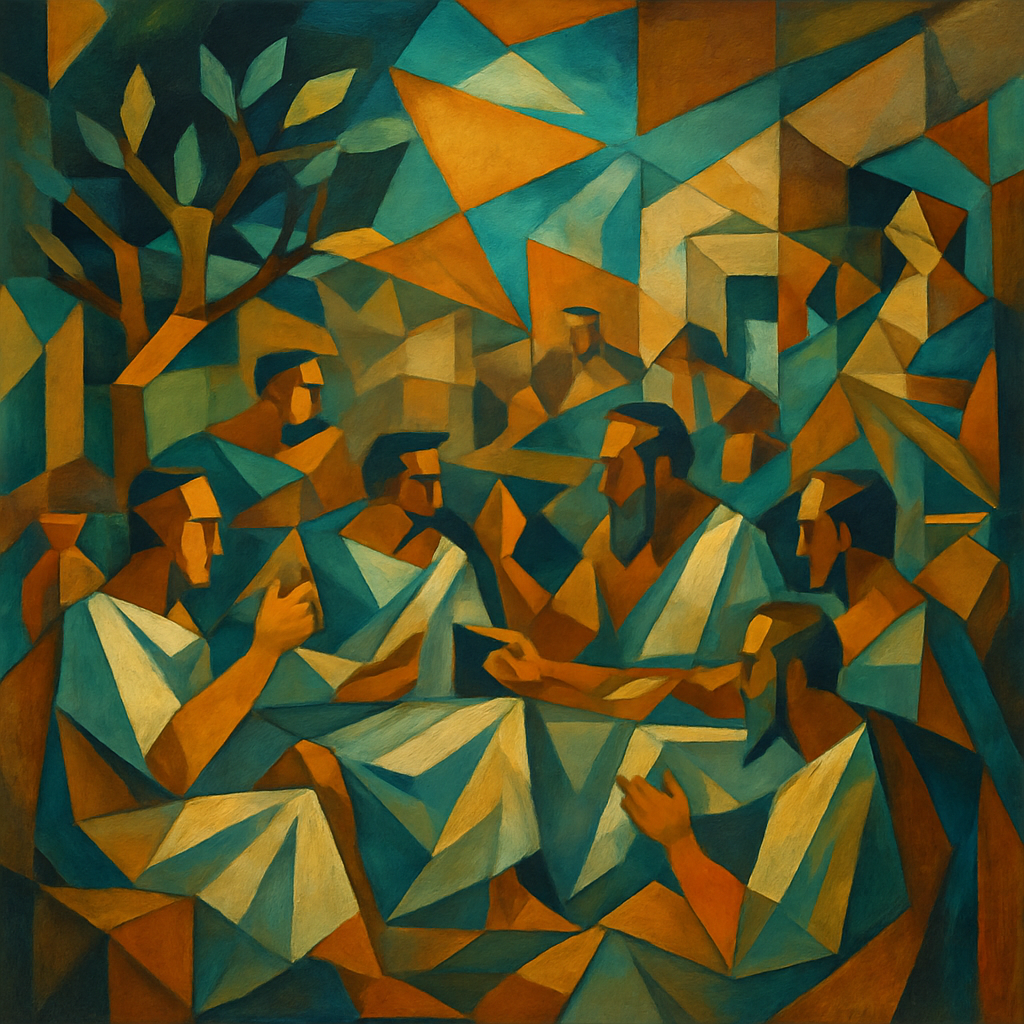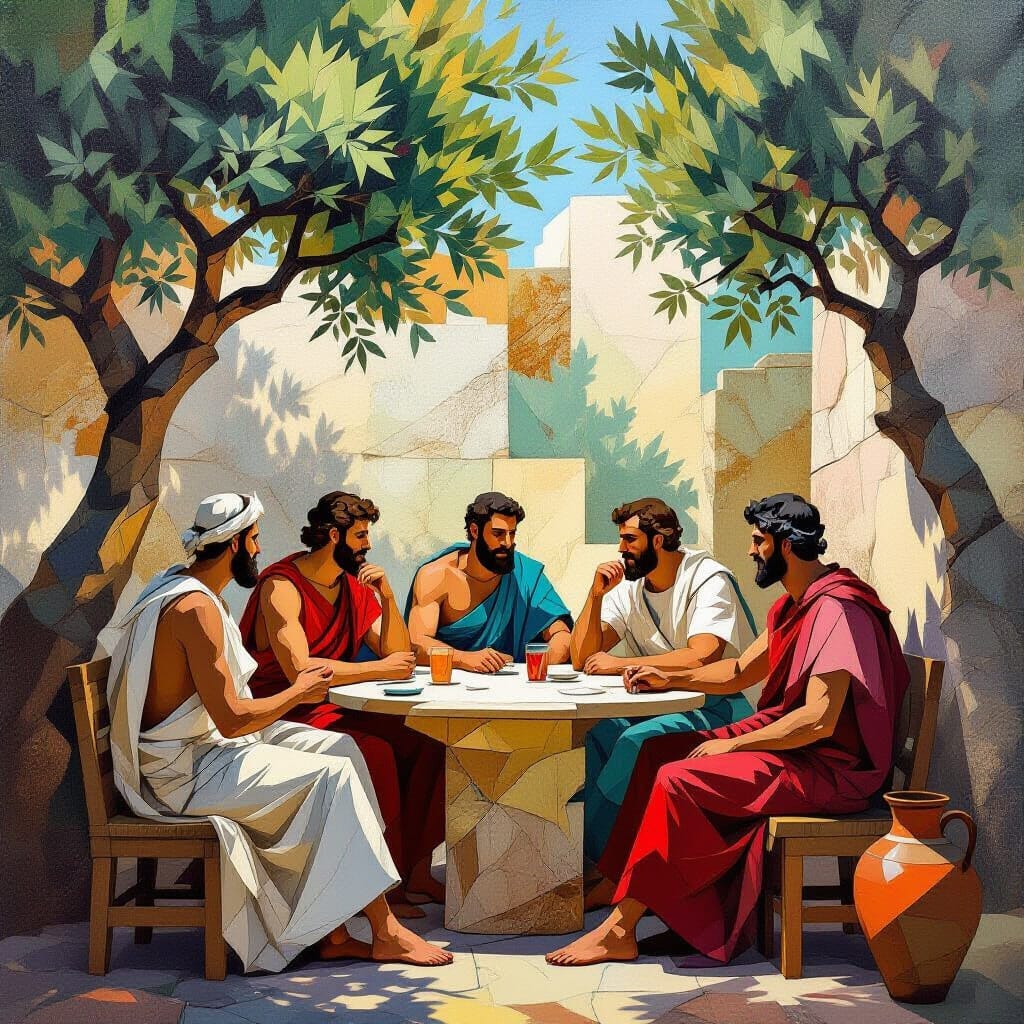
Welcome to the 400s BCE, where sandals slapped stone streets, democracy was just getting warmed up, and every second Athenian seemed to have a toga and an opinion. This was the century ideas went viral — minus the algorithms. Let’s talk about the original thought influencers: the Greeks.
The Creator of the Century: Socrates
Socrates wasn’t the kind of guy you invited to a party unless you were ready to question your entire existence. Known primarily for asking “Why?” until people either gave up or had an existential crisis, Socrates is the philosophical granddaddy of Western thought.
What is he known for? Socrates is most famous for developing the Socratic Method — a style of questioning that feels like a polite interrogation and is still used in law schools and therapy sessions to this day. He didn’t write anything down himself, but his student Plato (more on him soon) captured his ideas in dozens of dialogues.
What impact did he have on society? He redefined knowledge itself. Instead of memorizing the “truth,” he said wisdom comes from recognizing how little we truly know. This humility-as-intelligence move reshaped education, debate, politics, and ethics for centuries. Without Socrates, philosophy might’ve been just another branch of poetry.

Any awards? If you count a posthumous reputation as one of the greatest minds ever as an award, then sure. Otherwise, he won…a death sentence. For “corrupting the youth” and “impiety,” the Athenian courts made him drink hemlock. Athens regretted it later. A lot.
Was he financially successful? No. He walked around barefoot, wore the same clothes daily, and lived like an ancient minimalist monk. Think Diogenes, but with less barrel and more arguing. He famously claimed he lived a better life by not chasing wealth.
Was he famous during his lifetime or only after death? Both. He was known — and divisive — while alive, like your friend who posts too many hot takes online. But his real fame exploded post-mortem thanks to Plato’s writings, which made Socrates a kind of philosophical Obi-Wan Kenobi.
Did he collaborate with other notable creators? Absolutely. His dialogues were like a TEDxAthens series with the intellectual elite of the time. Most notably, Plato. And through Plato, Aristotle. That’s basically the triple crown of philosophy.
Is he known for any famous art? Yes — but mostly as the subject. Jacques-Louis David’s “The Death of Socrates” is a moody masterpiece showing him calmly giving a final lecture while sipping poison like it’s tea. He also pops up frequently in sculptures and frescoes — almost always mid-lecture.
Is he known for any other inventions? Not physical inventions, but he’s the godfather of critical thinking and structured argument. Socratic irony and the dialectical method are still alive in classrooms and debates everywhere.
Is he the subject of any famous art? See above — he’s art’s favorite martyr for truth. Most representations show him looking like a wise, slightly annoyed walrus with a great beard.
Any other interesting tidbits?
- He fought as a soldier in three wars. Yes, this philosopher also wielded a spear.
- He had a wife, Xanthippe, who was reportedly very outspoken. Some say she taught him patience. Others say she just yelled a lot.
- He claimed to be guided by a divine inner voice, a “daimonion,” which sounds cooler than “gut instinct.”
If you’re just joining us, don’t worry — you can catch up on our whirlwind journey through creativity and genius starting with Episode 1:
The Creators Series: A Lightning Tour of History’s Greatest Geniuses
Welcome to Episode #1 of the Creators Series — a grand overview of one dazzling mind per century (give or take a few)…medium.com
And now…
Art Prompt: A cubist reinterpretation of an ancient Greek symposium, with fractured geometry and angular forms depicting toga-clad figures in spirited discussion under olive trees. Muted earth tones mixed with sudden bursts of turquoise and terracotta. A chaotic yet harmonious composition evoking philosophical tension and communal energy. The mood is cerebral and electric, with sharp light and deep shadow playing across faceted stone walls and stylized amphorae.

Video Prompt: An animated sequence zooming through a cubist landscape of an ancient Greek symposium — jagged lines and interlocking geometric shapes move rhythmically as figures debate under shifting olive tree canopies. Intermittent flashes of pottery patterns and lightning strikes illuminate their ideas in motion. Bold transitions between philosophical icons and abstract arguments bring energy and surrealism to every frame.
Song Recommendations:
- “Baba O’Riley” by The Who (because every teenage wasteland needs a Greek chorus)
- “Take Five” by The Dave Brubeck Quartet (for an offbeat rhythm that suits offbeat genius)
Hit that follow, drop your favorite philosopher in the comments, and keep an eye out for the next episode — where we travel to Renaissance Florence and meet the minds who made art and science flirt in public.